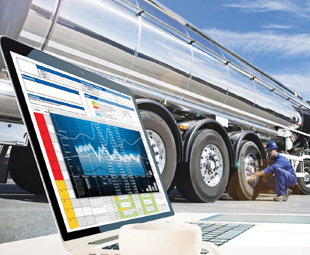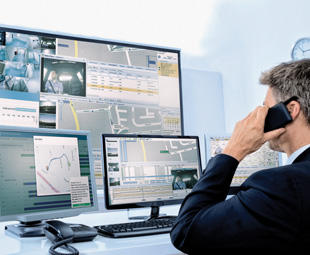Monitoring, maintaining and maximising fleet operations

Optimising operations and reducing costs is the only way to survive in the competitive transport industry. MARISKA MORRIS looks at technology that could assist transport companies to gain the upper hand
Despite the current state of the South African economy, there has been a 7,7-percent increase in income for road freight operators and a 5,6-percent raise in tonnage this year, according to economist Mike Schussler. He adds that 74,1 percent of all goods are transported by road in South Africa.
This figure excludes own transport, which refers to companies that do their own in-house transport. For example, companies like Pick n Pay that transport food to their various outlets. If this form of transport is included, Schussler estimates that road freight carries around
90 percent of all goods in South Africa.
However, this does not mean that the industry is not competitive. Paul Dickson, business development executive at Resolve Solution Partners, a partner of Imperial Logistics, notes: “We are operating in a very challenging industry. Companies need to be agile to survive.”
He notes the importance of adopting appropriate new technology, which could assist by reducing costs and increasing productivity.
Some transport companies are able to invest in their own technological developments. Imperial Logistics, for example, invested in a centralised control tower for all fleet and supply chain information. It reduces information delays with real-time responses to planning.
However, not all companies have the capital to invest in their own technology, instead, they need to consider technology that is already available on the market. Here are some of the latest developments to assist companies in better managing their fleets.
Tracking and telematics
The Roambee, administered in South Africa by T-Systems South Africa, is a tracking device that can track either cargo or fleets. The “bee”, or monitoring device, is placed on an object and sends alerts and reports regarding the location and condition of the tracked object to a client in real time.
When transporting heat-sensitive goods, for example, the “bee” can inform a transport operator when the temperature is too high. The battery lasts between 90 days and three years, depending on what is being tracked.
According to MiX Telematics, 42 703 vehicles have been reported stolen in South Africa this year. Kasigan Moodley, chief technical officer at MiX Telematics Africa, notes: “As road transport is the most popular way in which products are transported, high-value goods are guaranteed to be on the roads and, as a result, they are targeted.”
 “Solutions from MiX Telematics like MiX Track and React provide the fleet manager with a full view of his fleet at any given time,” Moodley adds. Hijacked vehicles can be traced and recovered with the use of telematics.
“Solutions from MiX Telematics like MiX Track and React provide the fleet manager with a full view of his fleet at any given time,” Moodley adds. Hijacked vehicles can be traced and recovered with the use of telematics.
Predictive maintenance
Most companies service a vehicle according to the dealership’s recommendations, or according to their own timeline. However, there are often unforeseen events that lead to unplanned maintenance. When a truck breaks down unexpectedly, a transport company can lose valuable time and money. Predictive maintenance prevents this form of unplanned maintenance.
Dereshin Pillay, head of manufacturing and automotive at T-Systems, notes: “The technology saves transport companies money. If they need 25 trucks to make their weekly deliveries, the system can tell them beforehand when the trucks will need maintenance. This gives the company the opportunity to substitute the trucks needing maintenance and still make their deliveries.”
Sensors can also be placed inside the truck to monitor the environment. The system identifies the optimal capacity at which the vehicle operates and creates a threshold. If the vehicle operates outside this threshold, the lifespan of the vehicle is reduced. Since the data from the sensors is captured in real time, any deterioration is picked up immediately, which, ultimately, results in less unscheduled down time.
Transport management system (TMS)
This technology is not new to transport operators, but it is extremely important. The correct TMS could assist with optimising freight planning, streamlining operations, reducing costs and providing a paperless process. There are numerous companies that offer these systems.
“Transport management technology is very important when considering optimisation, maintenance and operating costs. In terms of price, the industry is very competitive,” states Pillay.
He adds that the TMS from T-Systems can also assist companies to optimise their fleet by reducing the number of vehicles needed.
“It is much more cost effective to do the same work with 20 trucks rather than 25,” Pillay comments. TMS also acts as a safety feature for transport companies, especially against hijacking, which leads to downtime, a loss of productivity and increased operating costs.
The new human behaviour monitoring system from T-Systems can form part of a company’s TMS and can improve logistics operations. This system uses mathematical algorithms to optimise how employees work.
“The technology determines how long it takes to load a truck and how effectively it is loaded. Every 30 minutes of waiting time adds up. If a truck is loaded efficiently, it might be able to do an extra load that day,” Pillay says.
Transport companies will inevitably be forced to turn to technology in order to remain competitive. The only question that remains is which technology is most suited to their particular operation.
Published by
Focus on Transport
focusmagsa




